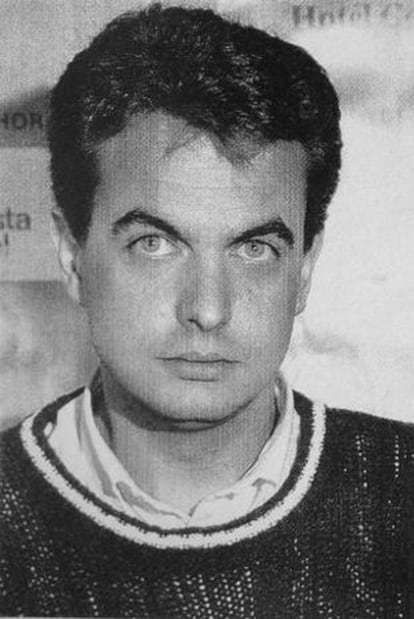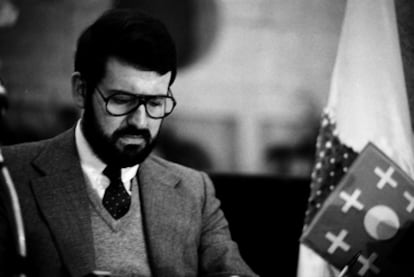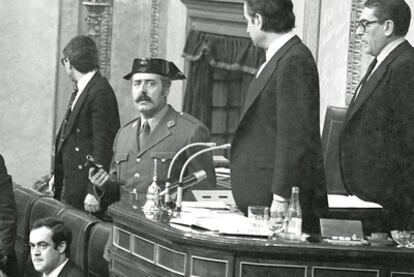Remembering the coup attempt 30 years on
Today's political leaders look back on the events of 23 February, 1981
"I spent the night glued to the radio. It was a nightmare"
Prime Minister Jos¨¦ Luis Rodr¨ªguez Zapatero was aged 20 and studying for an exam at the time of the coup
I remember February 23, 1981 very clearly: I was 20 years old and that evening I was at my parents' house in Le¨®n, studying for an exam in public finance. The radio was playing in the background. It was a live broadcast of the investiture debate. I heard the shots ring out in the midst of the vote and then the first moments of confusion. I quickly went to my father's office to tell him the news. From the very beginning it was clear that our country was facing a coup.
It was the beginning of a long and confused night, mostly because there wasn't any reliable news, and everything was hearsay. I remember that my father began calling up his friends, lawyers and politicians, and they all shared the same concerns. We spent the afternoon at home trying to figure out what was happening. Like all Spaniards, I didn't sleep a wink that night because I was glued to the radio.
It was like a recurring nightmare, a repeat of the worst moments in our history. I also felt enormous outrage because I thought they were trying to do to our generation what they had already managed to do to several generations of Spaniard: clipping our hopes of development, preventing us from living a life of freedom and clouding our promising horizons.
We quickly began to organize things so we could fight for democracy, and so we could express our revulsion at what had happened. The next day, we began to mobilize. I phoned up some classmates who shared the same political concerns, and we organized an event in the lobby of the Law School under a sign that read: "Long live the Constitution! In defense of democracy."
For people like me, who were young back then and beginning to discover the realities of this country, its politics and history, that day reinforced our belief that, despite all the resistance and difficulties, the mother language of our generation and the generations to follow was, irreversibly, democracy.
"I missed Milans' orders by just weeks"
Mariano Rajoy, Popular Party leader, had just completed his military service and was in Pontevedra
On that February 23, I wasn't in Valencia but, by just a matter of weeks, was already in Pontevedra. I had just finished my obligatory military draft, which I had completed at the general barracks in Valencia. By some miracle, I wasn't there to directly witness the state of siege orders given by [General Jaime] Milans del Bosch.
I found out about it on the radio the moment it occurred while I was getting a haircut. This was no ordinary parliamentary session and all the media were there broadcasting live.
I left the barber's and went home where, from that moment on, I stayed hooked to the radio all day. I also saw the king's message live, and everything that was happening around Congress. My first impression was a mixture of surprise, confusion and profound disbelief; I couldn't believe what was happening. Then came the fear that we might have to return to a brutal past and I was even embarrassed that those images of Spain were unfolding around the world.
After the initial shock passed, I clearly saw that this could not succeed. Like so many millions of Spaniards I went to express my support for democracy after the coup. A few months after the end of that year, I began to seriously devote myself to politics.
Where are they now? Ex-coup leaders live in relative obscurity
"I didn't duck because I thought about honor," recalls Santiago Carrillo
Thirty-two military officers and one civilian were charged with taking part in the coup conspiracy on February 23, 1981. Only three were acquitted. About half a dozen are now dead, including Jaime Milans del Bosch, the commander general who called out the tanks in Valencia.
Antonio Tejero Molina, the former Civil Guard lieutenant colonel who led a group of officers into Congress shouting at everyone "to be still," is now 79 and divides his time between his native M¨¢laga and Madrid. "My father has nothing to say," says his son Ram¨®n, a priest in M¨¢laga. Tejero served 15 years of a 30-year sentence before he was released. In a rare interview with Italian newspaper La Repubblica in 2006, he said: "Someone betrayed us. I complied with my duty as a Spaniard and paid for things I shouldn't have. But history will judge me."
Santiago Carrillo, former Spanish Communist Party (PCE) leader, was in the chamber galley when Tejero and his men stormed the chamber. He, along with then-outgoing Prime Minister Adolfo Su¨¢rez, refused to duck under his desk when Tejero started firing. "I thought about history, the honor of Congress, my party and my militancy as a communist." Current congress president Jos¨¦ Bono was also present. That night he asked one of his captives to accompany him to get a carton of cigarettes from his office.
Former General Alfonso Armada Comyn, 91, was once the personal secretary to the king before the coup and was considered to be the man who would have become Spanish leader if the conspiracy had succeeded. He spent five years in prison.
"I never knew any of the coup leaders. There has been a lot of lies said about me," he said.



Tu suscripci¨®n se est¨¢ usando en otro dispositivo
?Quieres a?adir otro usuario a tu suscripci¨®n?
Si contin¨²as leyendo en este dispositivo, no se podr¨¢ leer en el otro.
FlechaTu suscripci¨®n se est¨¢ usando en otro dispositivo y solo puedes acceder a EL PA?S desde un dispositivo a la vez.
Si quieres compartir tu cuenta, cambia tu suscripci¨®n a la modalidad Premium, as¨ª podr¨¢s a?adir otro usuario. Cada uno acceder¨¢ con su propia cuenta de email, lo que os permitir¨¢ personalizar vuestra experiencia en EL PA?S.
?Tienes una suscripci¨®n de empresa? Accede aqu¨ª para contratar m¨¢s cuentas.
En el caso de no saber qui¨¦n est¨¢ usando tu cuenta, te recomendamos cambiar tu contrase?a aqu¨ª.
Si decides continuar compartiendo tu cuenta, este mensaje se mostrar¨¢ en tu dispositivo y en el de la otra persona que est¨¢ usando tu cuenta de forma indefinida, afectando a tu experiencia de lectura. Puedes consultar aqu¨ª los t¨¦rminos y condiciones de la suscripci¨®n digital.








































